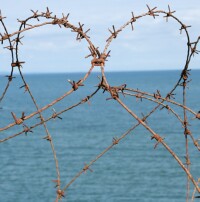What I learnt when I tried to kill myself
It’s all too easy to glamourise suicide once it’s happened. To pack out a funeral ceremony, dripping platitudes, telling everyone you “wish you’d known”. But if the potential suicide victim “fails”?
What I learnt when I tried to kill myself
What do you do when everyone knows what you did?
By Charlotte Dingle
A few weeks ago I joined the same exclusive club as Drew Barrymore, Eminem, Britney Spears and a host of other celebs. Like your average A-list party, there was plenty of booze and a few pills involved. There was a trip to casualty, too – again, not atypical. But this was a party of one. Mired in sadness, devoid of hope, and brooding on a stupid fight with my partner, I sat in my bedroom and necked anti-depressants (oh the irony) like Smarties, all washed down with a tidal wave of whisky. I barely remember what followed immediately afterwards. All I know is that I survived, thanks to the swift actions of said partner.
My friend G (full name withheld as her family still refuses to accept that she committed suicide) did the same thing seven years ago, at exactly the same age I am now. She was smart, vivacious, funny, bloody gorgeous – the last person you’d expect to ever feel unhappy. We’d been giggling over fancy dress plans just the day before it happened. But G died, drunk and emotional after storming out of the pub following an argument with her boyfriend. Later on, he tried to kill himself by starting a fire in his flat. He ended up in a prison psychiatric hospital. It was so, so sad.
Every year in the UK, 5,000 people succeed in committing suicide. As many as 100,000 are estimated to have attempted it. They shoot themselves, they overdose, they slash veins and they inhale gas. Most of the time, the people around them have no idea that this drastic final gesture is on the cards. Because part of the reason that so many take their own lives is the tremendous taboo surrounding depression and suicide. I first broke my silence over mental health issues when I came clean about my diagnosis of Borderline Personality Disorder on this very website. A lot of people warned me against it. “It will affect your whole career,” they said. “Your name will be out there, attached to that.” I won’t lie: I was terrified. But something inside me screamed that I had to write it regardless. That maybe that was the kind of thing my career should actually be about, above all else.
As it turned out, that article has now been shared almost 16,000 times and counting. For something born of such pain, such feelings of inadequacy and shame, reactions to it have made me feel pretty good about myself. But the day after I made my attempt, I was nevertheless terrified when I awoke to a barrage of Facebook message notifications. “Are you OK?” seemed to be the running theme. Filled with creeping dread, I checked out my last status update. Oh fuck. Turns out I’d drunkenly told the world exactly what had happened. As people often do when they + social media with booze and despair.

